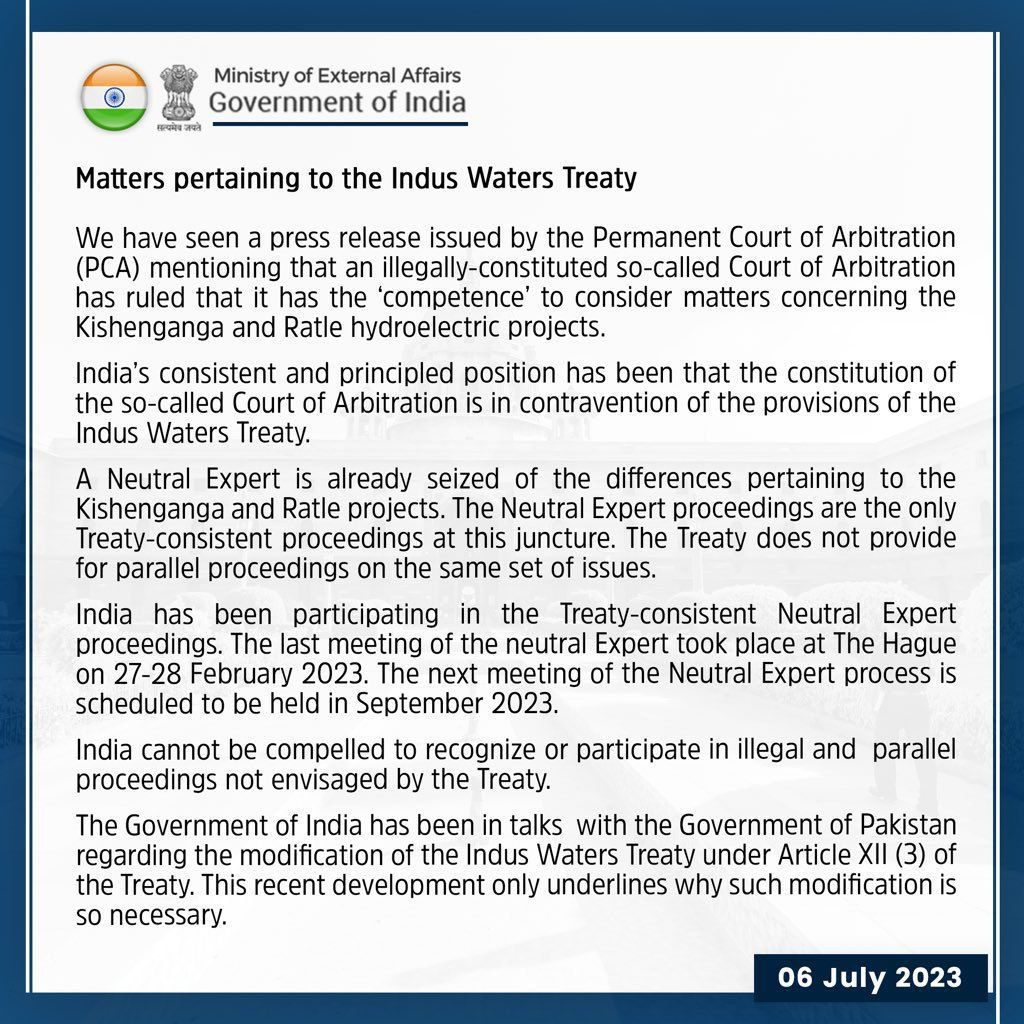India firmly rejects the jurisdiction of the Hague Court on the Indus Water Treaty between India and Pakistan. The Permanent Court of Arbitration or Hague Court attempted to side with Pakistan over IWT. However, India quickly and firmly called out the statements – calling the court itself an illegal mechanism. But why does the international community continue to back Pakistan despite its overt terror links?
What Is the Hague Court & Why India Calls It Illegal
The Permanent Court of Arbitration (PCA) in The Hague administers the so-called Court of Arbitration under the IWT, set up in 1960 via the World Bank. In June 2025, the Hague Court issued a “supplemental award” to affirm its authority to rule on Pakistan’s objections regarding IWT. The Hague Court asked India to stop work on Kishanganga (330 MW) and Ratle (850 MW) hydro projects. The directive was issued to counter India’s unilateral abeyance of the treaty following the Pahalgam terror attack as part of the non-kinetic actions on Pakistan and its state-sponsored terrorism.
India responded categorically to the Hague Court and its overstepping into India’s internal and foreign policies:
- Bharat has never recognized the Court’s legitimacy.
- India calls the tribunal “illegal” and a “charade at Pakistan’s behest,” asserting it violates the treaty.
- It points out that by placing the IWT in abeyance, India no longer owes obligations under it, and the Court has zero jurisdiction.
For India, Pakistan’s choice to go straight to the PCA or Hague Court bypassed the neutral expert mechanism envisaged in the treaty. Thus, rendering the Court’s formation a procedural breach. Therefore, India labels any award from that Court null and void.
India’s Sovereign Security and Terror Argument
India suspended the IWT as a sovereign response to the 22 April 2025 Pahalgam terror attack. Pakistani Army personnel on loan to terror organizations infiltrated Kashmir and killed 26 tourists and civilians. New Delhi demanded Pakistan’s irreversible renunciation of cross-border terrorism before restoring the treaty.
Bharat demands the following from Pakistan to sit at the table of diplomacy on bilateral issues:
- Strict judicial action post surrender of arms by all militants in Pakistan
- Extradition of Wanted Terrorists to India
- Complete renunciation of Terrorism and dismantling of terror infrastructure in Pakistan
- Return of PoJK to Bharat
- Return of Gilgit-Baltistan to India
- Renunciation of all claims to occupied land by Pakistan
MEA emphasized that India lawfully exercised its rights under the Vienna Convention Article 1 to hold the IWT in abeyance. Thus, no unrecognized and illegal international body can question a sovereign nation’s security actions.
Pakistan’s “Act of War” & Global Support
Pakistan viewed India’s suspension as a violation of the IWT. Its leaders and military heads began sending Hate-Speech from across the border. They threatened to treat water diversion as an Act of War. Islamabad is trying to exert international pressure to make India restore IWT. It is preparing to challenge India’s suspension through multiple international forums: PCA, International Court of Justice, World Bank, and even the UN Security Council.
However, Pakistan is unwilling to do what India rightfully demands – i.e. – Stop State-Sponsored Cross-Border Terrorism!
On one hand, they threaten war for water, and on the other, they ask international communities to throw Pakistan a “Pitty Party” – begging for loans and mediation! Unfortunately, sold in cryptocurrency, Pakistan’s diplomatic gambit enjoys tacit support globally. Analysts wonder how long Human rights organizations are willing to turn a blind eye to Pakistan’s reality. How long will the global community stay silent on Pakistan’s well-documented history of harboring terrorists? India rightly questions why a state, repeatedly funding, training, and sponsoring militant groups is allowed to flourish. Moreover, Bharat wonders why the world does not recognize Pakistan as a global exporter of terrorism.
Is the World Turning a Blind Eye?

India’s concerns go beyond river waters—they strike at the heart of how nations with terror links avoid accountability. If Pakistan can provoke India’s lawful security actions, rely on global legal arbitration, and face little consequence for terror exports, it sends a dangerous message to global governance.
- Why does PCA uphold a tribunal India never accepts?
- Why does the international system shield Pakistan despite terror ties?
- Are terror-linked states permitted to weaponize law when diplomacy fails?
India has acted within its rights by suspending a treaty triggered by terrorism, rejecting an unlawful tribunal, and defending its sovereignty.
It’s high time the world confronts why a terror-tainted Pakistan continues to earn legal and diplomatic cover, while India’s security concerns are sidelined. Until the international community stops rewarding terror-linked states with sympathy, loans, aid, and legal advantage – Bharat’s only recourse of action is to stay firm, uphold its right to safety, and demand justice – not just water.


